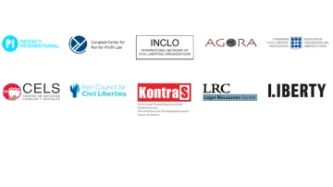Search
Content type: Long Read
18th December is International Migrants Day. It’s a day designated by the United Nations, dedicated to recognising the “important contribution of migrants while highlighting the challenges they face.”On this day we wish to recognise in particular the countless human rights violations that people experience at borders and within hostile immigration systems. We thank those who survive these violations for sharing with us and others their experiences of such violations, and for accepting to…
Content type: Advocacy
Privacy International joined civil society efforts to call the South African Parliament not to approve the draft General Intelligence Laws Amendment Bill 2023 (GILAB), which was approved by the Cabinet and introduced in Parliament.
The Bill was proposed by the South African government, after the Constitutional Court found the Regulation of Interception of Communications Act of 2002 (RICA) unconstitutional on multiple grounds.
The draft Bill fails to meet the human rights standards on many…
Content type: Advocacy
Content type: Long Read
Our world is undergoing a seismic process of increasing digitisation, which sees the proliferation of new technologies and the growing integration of these technologies into public services, which rely more and more on copious amounts of personal data and on automated processes. This phenomenon has a unique impact upon the rights of persons with disabilities. As the era of global digitisation causes societies worldwide to undergo a digital metamorphosis, persons with…
Content type: Advocacy
The European Commission proposed the PWD in December 2021 with the objective to improve the working conditions in platform work. In February 2023 and June 2023 respectively, the European Parliament and the Council reached their respective positions, with trilogue negotiations beginning in July 2023.
PI welcomes the PWD as a mechanism to protect workers’ rights in response to transformations in the workplace, specifically with regard to the growing adoption of algorithmic management systems and…
Content type: Advocacy
In the last few years, electoral processes and related activities have undergone significant changes, driven by the development of digital technologies.The use of personal data has redefined political campaigning and enabled the proliferation of political advertising tailor-made for audiences sharing specific characteristics or personalised to the individual. These new practices, combined with the platforms that enable them, create an environment that facilitate the manipulation of opinion and…
Content type: Long Read
TAKE ACTION TO STOP THE END OF PRIVACY IN PUBLIC1. IntroductionThe use of facial recognition technology (FRT) by law enforcement and private companies in public spaces throughout the UK is on the rise. In August 2023, the government announced that it is looking to expand its use of FRT, which it considers “an increasingly important capability for law enforcement and the Home Office”. The indiscriminate use of this dystopian biometric technology to identify individuals in public spaces is a form…
Content type: Advocacy
Dejusticia, Fundación Karisma, and Privacy International submitted a joint stakeholder report on Colombia to the 44th session of the Universal Periodic Review at the UN Human Rights Council.Our submission raised concerns regarding the protection of the rights to freedom of expression and opinion, to privacy, and to personal data protection; the shutdown of civil society spaces; protection of the right to protest; and protection of the rights of the Venezuelan migrant and refugee population.…
Content type: Long Read
IntroductionData about our health reveals some of the most sensitive, intimate - and potentially embarrassing - information about who we are. Confidentiality is, and has always been, at the very heart of medical ethics. People need to be able to trust their doctors, nurses and other healthcare providers so that they are not afraid to tell them something important about their health for fear of shame, judgement or social exclusion.It’s no surprise then that data protection regimes around…
Content type: Long Read
Introduction
The 28th of September marks International Safe Abortion Day. It remains a day necessary to mobilise and raise awareness of the continued struggles women and girls face when accessing reproductive healthcare, including access to safe abortion. Across the world, abortion continues to be criminalised, restricted and in some places under attack. All of which constitute severe obstacles for women and girls to fully exercise their human rights, particularly their right to privacy, which…
Content type: Advocacy
Content type: Examples
Numerous video clips from Amazon's in-van driver-facing surveillance cameras are appearing on Reddit in violence of Amazon's stated privacy policies and raising questions about drivers' privacy. The videos are clearly not being posted by drivers themselves, but come from inside Amazon delivery partners, though who is posting them is unknown. The cameras capture all aspects of drivers road behaviour; the company claims they protect road safety. Drivers say they do not have access to the videos.…
Content type: Press release
Today the European Court of Human Rights held the United Kingdom accountable for its digital spying, even when that spying affects people outside of the UK’s borders.In this case, Mr Wieder and Mr Guarnieri, both researchers who work on information security and privacy, challenged the lack of access to redress mechanisms for alleged breaches to their rights to privacy and freedom of expression by UK intelligence agencies before the European Court of Human Rights.Mr Wieder and Mr Guarnieri…
Content type: Advocacy
Our submission focussed on the evolving impacts of (i) automated decision-making, (ii) the digitisation of social protection programmes, (iii) sensitive data-processing and (iv) assistive technologies in the experiences and rights of people with disabilities.We called on the OHCHR to:Examine the impact that growing digitisation and the use of new and emerging technologies across sectors has upon the rights of persons with disabilities;Urge states to ensure that the deployment of digital…
Content type: Advocacy
Our submission focused on (1) the ways in which states are adopting data-intensive ID systems; (2) the adoption by national immigration enforcement agencies of other privacy-intrusive modes of surveillance and control, including tracking by way of 24/7 Global Positioning System (GPS) technology and mobile device data extraction; (3) how the intensification of border surveillance technologies facilitates further human rights violations; (4) the impact of border externalisation and transfer of…
Content type: Long Read
Why does this decision matter?
Our complaint against Criteo formed part of a larger set of coordinated complaints we filed in 2018 against 7 data brokers (Acxiom, Oracle), AdTech companies (Criteo, Quantcast, Tapad), and credit referencing agencies (Equifax, Experian) with data protection authorities in France (CNIL), Ireland, (DPC) and the UK (ICO). The EU General Data Protection Regulation (GDPR) had recently come into force, and the AdTech industry was (and still is) a prime affront to the…
Content type: Advocacy
Privacy International (PI) notes the Bureau’s text of the WHO convention, agreement or other international instrument on pandemic prevention, preparedness and response (“WHO CA+”).
PI has sought to closely follow and engage with the discussions leading up to the draft treaty, despite the significant limitations to civil society participation in the process. In February 2023, we intervened during the briefing organised by the INB bureau and published our comments on the zero draft of the WHO CA…
Content type: Advocacy
Background
In August 2022, Amazon announced that they had entered into a definitive merger agreement to acquire iRobot, a company that specialises in designing and building consumer robots. The transaction was formally notified to the European Commission on 1 June 2023, while the UK Competition and Markets Authority (CMA) has already launched an investigation into the transaction since April 2023.
We believe that this acquisition is likely to significantly impede effective competition in and…
Content type: Long Read
In 2022, Privacy International continued to produce real change by challenging governments and corporations that use data and technology to exploit us. And, we produced substantial impact that directly affects each of us.
Here are a handful of our biggest achievements in 2022.
WE CHALLENGED COMPANIES TO CHANGE THEIR BUSINESS MODELS AND PRACTICES
Regulators in UK, France, Greece, and Italy fined and restricted Clearview AI’s activity
Clearview AI built a massive database of our biometrics, by…
Content type: Advocacy
This joint submission to the European Commission consultation on security-related information sharing was signed by Border Violence Monitoring Network (BVMN), Statewatch, Euromed Rights, European Digital Rights (EDRi), Access Now, Privacy International (PI), Refugee Law Lab (York University), Homo Digitalis and the Platform for International Cooperation on Undocumented Migrants (PICUM). Signatures were subsequently added from European Network Against Racism (ENAR), Dr Derya Özkul and Dr Niovi…
Content type: Long Read
The final report on the 2022 Kenyan election is the result of a collaboration with the Carter Center as part of a joint pre-election assessment focussing on the use of technology in the run up to and during the Kenyan election which took place 9 August. The final report, published this month, follows our preliminary statement of September 2022.
Below we set out a few key observations in connection with the use of data and technology, as well as some of the key data protection incidents.
Key…
Content type: Video
In January 2023, the UK's Investigatory Powers Tribunal handed down a landmark judgment. The Tribunal held that there were “very serious failings” at the highest levels of MI5 - the UK's domestic intelligence agency - to comply with privacy safeguards from as early as 2014, and that successive Home Secretaries did not to enquire into or resolve these long-standing rule-breaking despite obvious red flags.
In this episode, we talk to Meg Goulding, a lawyer at the UK-based campaigning…
Content type: Examples
In a report, the Center for Democracy and Technology finds that student privacy laws are insufficient to protect students in the face of increasing use of remote education technologies and insufficient staff and other resources. CDT examined the practices of 43 local education authorities and their relationships with their state education agencies in order to understand what information is transparently and proactively available to families, staff, and other stakeholders.
https://cdt.org/…
Content type: Advocacy
The submission provides PI’s information and analysis of some of the topics listed in the call. The widespread use of new technologies presents both opportunities and challenges for the protection of human rights, including the right to life and the right to privacy. PI believes that is essential that states take a human rights-centered approach in their use of these technologies, and ensure that their use is consistent with international human rights law. By doing so, states can ensure that…
Content type: Advocacy
Privacy International (PI) welcomes the zero draft of the WHO convention, agreement or other international instrument on pandemic prevention, preparedness and response (“WHO CA+”). PI has sought to closely follow and engage with the discussions leading up to the draft treaty, despite the significant limitations to civil society participation in the process.
PI believes that the zero draft offers a good basis for negotiations. In particular, we welcome the inclusion of a provision on…
Content type: Case Study
This piece was written by Privacy International, based on publicly available information and on research by our partners at Hiperderecho
Overview
The Documento Nacional de Identidad (DNI) is the personal ID card recognised by the Peruvian State in any situation where a person might have to identify themselves, be it in an administrative, judicial, civil, or commercial context. The DNI also grants its holder the right to vote.
The DNI issuing and overseeing body is the Registro Nacional de…
Content type: Advocacy
Privacy International (PI), the European Center for Not-for-Profit Law (ECNL), International Network of Civil Liberties Organizations (INCLO), Agora, the Canadian Civil Liberties Association, Centro de Estudios Legales y Sociales in Argentina, the Irish Council for Civil Liberties, KontraS in Indonesia, the Legal Resources Center in South Africa, and Liberty in the UK welcome the opportunity to provide input to the global study of the UN Special Rapporteur on the promotion and protection of…
Content type: News & Analysis
Our mobile phones contain all kinds of data that ranges from photos, videos and emails to information about our health, the places we visit and our leisure time. This data is often relied upon by law enforcement authorities in criminal investigations.
Mobile phone extraction (MPE) tools are used for this purpose as they enable police and other authorities to download content and associated data from people’s phones. These tools are supplied by private companies to security forces and…
Content type: Long Read
In August 2021, PI published the report An unhealthy diet of targeted ads where we uncovered how personal data was shared by diet companies through their online ads and online testing. Our findings were quite grim, with highly sensitive personal data shared with third parties without consent.
Following this initial report, we performed follow-up research with the same methodology and by September 2021 we reported a number of positive changes from two of these websites: BetterMe and VShred.…
Content type: Long Read
We won our case against the UK’s Security Service (MI5) and the Secretary of State for the Home Department (SSHD). The Investigatory Powers Tribunal (IPT) – the judicial body responsible for monitoring UK’s intelligence and security agencies – held that MI5 acted unlawfully by knowingly holding people’s personal data in systems that were in breach of core legal requirements. MI5 unlawfully retained huge amounts of personal data between 2014 and 2019. During that period, and as a result of these…
























